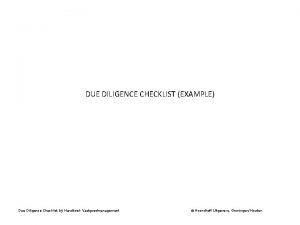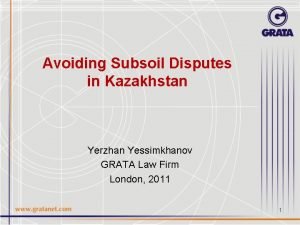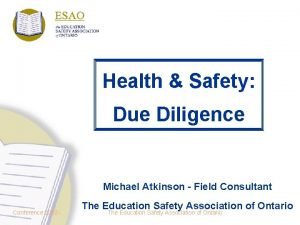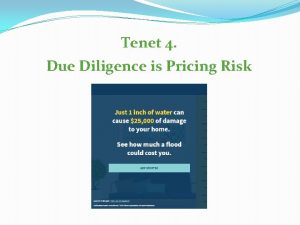Human Rights Due Diligence as a mechanism for








- Slides: 8

Human Rights Due Diligence as a mechanism for prevention and enhancing access to justice Claudia Saller European Coalition for Corporate Justice Access to Remedy for victims of human rights abuses - Role of the EU European Parliament, 11 April 2018

With 21 member groups representing over 250 organisations from 15 countries, the European Coalition for Corporate Justice (ECCJ) is the only European coalition bringing together campaigns and national platforms of NGOs, trade unions, consumer organisations and academics in order to promote corporate accountability.

Human Rights Due Diligence (HRDD): “a means by which companies can identify, prevent, mitigate and account for the negative human rights impacts of their activities or those linked to their business relationships. ”

Current legal situation for companies under EU legislation: No common legal HRDD obligation across business sectors EU Timber Regulation (due diligence obligations for timber importers); EU Conflict Minerals Regulation (supply chain due diligence obligations); Non-Financial Reporting Directive (disclosure obligations on human rights risks); EU Action Plan for financing sustainable growth (mentions “the possible need to require corporate boards to develop and disclose a sustainability strategy, including appropriate due diligence throughout the supply chain”)

A harmonised obligation to HRDD within the EU could provide for: - A level playing field for companies; - Comparable accountability standards; - Access to justice for victims in and outside of Europe.

5 key elements for effective HRDD legislation - Covers all internationally recognized human rights and international environmental standards; - Applies to large companies and SMEs with “high risk” activities; - Enshrines the companies’ responsibility to respect human rights and environmental standards in their operations; - Requires companies to put in place appropriate Due Diligence, and to report on how they have done that; - This obligation extends to the entire corporate structure including the supply chain.

HRDD legislation is interrelated with Access to Justice: - Establishes civil liability of companies for damage caused by entities under their direct or indirect control; - Allows persons harmed by the breach of human rights or environmental standards to bring an action against the parent company; - Addresses procedural and other obstacles for victims (Burden of proof, legal aid, etc. ).

Conclusion - Adequate Due Diligence brings clear rules for everybody and can prevent problems before they happen; - Access to Justice for victims must be in the line of thinking when performing Due Diligence; - EU: 28 states with duty to protect human rights and to ensure access to remedy - within one internal market (Pillar I and III of UNGP).














